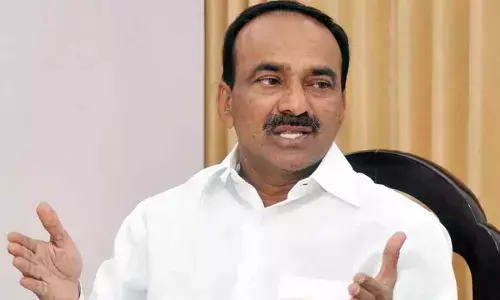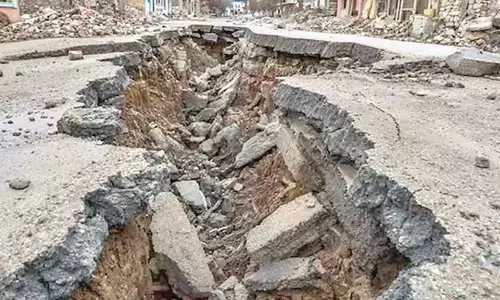Swachh Bharat (clean India) programme is acquiring potential to be a turning point in India’s transition to next level of economic development. Even more significant is its potential to change the mind set of people of the country.
.jpg)
Prime Minister Narendra Modi’s reiteration that it should not be viewed as a yet another Government programme but a movement of people should receive serious consideration.
We need not wait for five years to see the results of this landmark initiative. There are equally important other initiatives that need to be considered with similar thrust and seriousness. What are these?
A WWF report recently has reminded us that since last 40 years land, rivers, forests, oceans have lost out their potential by a significant extent. The result of which we are witnessing holocausts in Uttaranchal earlier, in Jammu and Kashmir and Visakapatnam more recently.Who knows where it is going to be next. Which one Initiative could neutralize such a threat and also help in addressing yet another issue bothering the country? That is the energy crisis.Because of more recent Hudhud cyclone there was extensive destruction of greenery in
Visakapatnam with uprooting of trees. This is expected to increase temperature of the region by two degrees in the coming months which means increase in consumption of electricity apart from effects on health and productivity of people.If, on the other, temperatures in Andhra Pradesh (AP), for example, could be reduced by five degrees next ten years, the face of the state could change for good. Only then the state could expect to excel and achieve its development goals. Is it possible to bring down temperatures when in fact it is rising these days as never before? If Malaysia could do so long ago, why not Andhra Pradesh? Prosperity of Malaysia in a matter of couple of decades is attributed to its determined efforts to green the country by bringing down the temperature of the country by more than five degrees.
In anxiety to build infrastructure and fast catch up as a developed state, all out efforts are being made to convert fertile agriculture lands of the state into super cities and concrete jungle.There seems so far no parallel commensurate concern for the environmental implications.This however does not mean that the state should not improve living standards of its people.
The people should be more productive, prosperous and the state should stand out as a model state of the country. The state is poised to become. But that cannot be ensured if any of the environmental features are threatened.The responsibility for such a concern and initiative should not be limited to the government.
In fact, the primary role should be that of citizen and communities. Civil society activism has to acquire a mission mode and take the course of a movement. This calls for citizen and communities led campaign and actions as to the need to bring down temperature by greening the state. How a decline in temperature helps the state need to be packaged and fed into popular belief system.
The new state of Telengana very rightly and promptly announced a three year long ambitious programme towards greening one-third of the terrain of the state. This Harita Haaramprogramme proposes a green week every month next three years when elected representatives and government offices take to planting 210 crore seedlings and saplings including Neem on all barren places, river and canal beds and shore areas at the rate of 40 lac in every assembly segment. The Chief Minister of Telengana in fact wishes people to feel such a way that they are walking through a forest. It is a visionary idea. But such plans should not be forgotten or sidelined.
As to the activism, three programmes are suggested for massive and prolonged movement. The first is echo system of water sources ..water tanks, canals and rivers flowing in the state. The beds of all these need to be planted with trees like neem and the like (experts could identify a set of trees or plants of certain species). Local citizens and communities should take on this task or mission as an urgent responsibility. The government could help by way of supplying species. A competitive spirit has to set in between communities to do this for all local water sources. Programme of dredging water sources should once again be taken up on a war footing simultaneously.
A second massive mandatory programme should be for bettering water levels everywhere. Rain water harvesting has to be a concern of the local community not merely of the government, there must be other ways of reviving, reenergizing water sources. A water conservation and reuse practice should not remain as a campaign rather it should be a tradition or ritual, a compulsion and part of life style. Local school and youth should be convinced of logics and entrusted with the responsibility.
Another mission parallely is minimizing the extent of use of air conditioners and use of petrol or diesel based vehicles for individual use. The Government should upgrade the quality of public transport vehicles and also their maintenance, reliability, frequency and should be such that public transport should be viewed as good enough. They should become mandatory practices.If children could go by school bus why they cannot continue using a pooled service. There must be alternative technology to air conditioner like water coolers which require least electricity and release least carbon. Sooner these changes in life style the better it is.
A third campaign should be for adopting to solar source for household and institutional uses.Both government and households have equal responsibility. Despite giving subsidy by the government for more than a decade, hardly five percent households have taken to solar(whereas despite taking to solar almost a decade after India initiated, more than one-fifth of households in China already rely on solar). Government should promote manufacture of solar panels within and restrain China dumping in India. This is not possible without an all out motivational campaign among stakeholders like electrical consultants, contractors, architects,manufacturers, etc.
These campaigns need to be taken up in a mission mode. The government role should be more of facilitative and external review. The initiative and responsibility should be that of citizens,communities and civil society organisations.
Industry and corporates too should be in the fore front in initiating and supporting each of these missions and movements. Now that the new Company Law allows all such expenditure under CSR, these should become long term concerns and commitment of corporates.
There is nothing new I'm saying here. In fact, NT Rama Rao and Chandrababu Naidu had taken up these in the earlier years. But those ideas were not pursed to become life style concerns and with seriousness that they deserve. And they were taken up more as government programmes.
Now the government of Telengana has gone a step ahead. One positive outcome of disastrous Hudhud cyclone in Visakapatnam is to revive the programme to plant trees. Local citizens have taken to the idea. They should set an example. This initiative should not limit to Visakapatnam alone.

.jpg)











